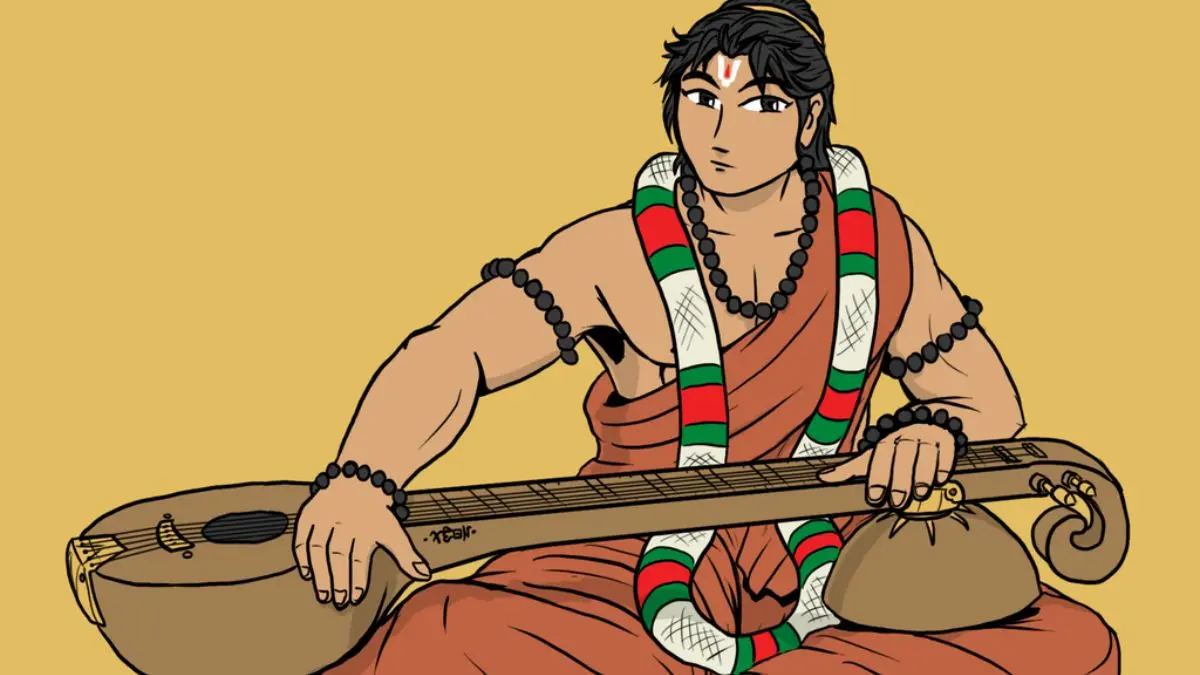Narada Muni, also known simply as Narada, is one of the most captivating figures in Hindu mythology, known for his playful, sometimes mischievous nature and his role as a cosmic messenger between the gods, sages, and humanity. His unique character—part sage, part celestial musician, and part troublemaker—makes him a key figure in many divine events and stories across ancient scriptures like the Mahabharata, the Ramayana, and the Puranas. With his trademark veena (a musical instrument) and a relentless dedication to the chant of “Narayana” (a name for Lord Vishnu), Narada’s presence is often felt when gods and mortals alike need guidance, advice, or sometimes a nudge towards their destinies.
The Origins of Narada Muni: A Divine Sage with a Celestial Birth
Narada Muni is considered a divine sage, or Devarishi, meaning a sage with celestial status. According to the Puranas, Narada was born from the mind of Lord Brahma, the creator, and is hence considered a manasaputra or “mind-born son.” From a young age, Narada was blessed with deep wisdom, musical talent, and a profound devotion to Lord Vishnu. Despite his lofty birth, he was also known for a streak of mischief, often causing situations that tested the resolve and wisdom of gods, humans, and demons.
Narada’s Unbreakable Devotion to Lord Vishnu
One of Narada’s defining traits is his unwavering devotion to Lord Vishnu. Known as the supreme devotee or parama bhakta, Narada would constantly chant “Narayana, Narayana” in Lord Vishnu’s honor. This devotion often placed him as Vishnu’s confidant and messenger. Narada’s devotion was so intense that he saw everything through the lens of his faith, and this steadfast love for Vishnu became the driving force behind many of his actions and interactions with others.
The Role of Narada Muni as a Divine Troublemaker
Narada Muni is famous for his knack for stirring trouble, but always with a higher purpose. His mischief, known as Leela, or divine play, was never meant to harm but rather to teach, reveal hidden truths, or move events forward. Through his sometimes controversial actions, Narada set the stage for significant events, often acting as a catalyst for divine intervention. Here are some famous examples of his playful interventions:
- The Curse of Narada and the Creation of Gandharvas and Apsaras: In one instance, Narada’s pride led him to seek out Lord Vishnu’s praise, believing himself to be unaffected by kama or lust. Vishnu, however, showed him the truth through an illusion, proving that even Narada was not immune. From this event, Narada realized the strength of humility, and it is said that Gandharvas and Apsaras were created to remind people of the allure of worldly desires and the importance of staying focused on the divine.
- The Story of Narada and Princess Damayanti: Narada was instrumental in the love story of King Nala and Princess Damayanti. He spread tales of Damayanti’s beauty and virtue, leading many princes and even gods to seek her hand. Narada’s involvement in this matchmaking resulted in a divine competition, where the gods disguised themselves as Nala. Narada’s influence in this story exemplified his role as a creator of challenges that ultimately led to greater learning and destiny fulfillment.
Major Stories of Narada Muni and His Divine Influence
Narada’s wisdom and wit play pivotal roles in various mythological stories that shape Hindu beliefs and cultural values. Here are some of the most prominent stories:
A. Narada and the Devotion of Dhruva
One of the most touching stories involving Narada is that of Dhruva, a young prince who sought Lord Vishnu’s blessings. Dhruva, mistreated by his stepmother and dismissed by his father, yearned to find solace in Vishnu’s grace. Narada, initially discouraging the young boy to test his resolve, eventually guided Dhruva in his penance, teaching him the path of devotion. This resulted in Dhruva’s transformation into the eternal Dhruva star, symbolizing the rewards of unwavering faith.
B. Narada’s Role in the Ramayana
In the epic Ramayana, Narada plays a vital role in the story of Lord Rama. He appears to Valmiki, the author of the Ramayana, and narrates the ideal qualities of Rama, inspiring Valmiki to compose the timeless epic. Narada’s words influenced Valmiki’s life and led to the creation of the Ramayana, preserving the story for future generations. Narada also played an indirect role in testing Sita’s purity, challenging Rama’s decision-making and bringing forth questions of duty and morality.
C. The Mischief with the Gods in Samudra Manthan
During the churning of the ocean, or Samudra Manthan, Narada was actively involved in creating conditions that escalated tensions between gods (devas) and demons (asuras). He knew that the potion of immortality (amrita) would result in further conflicts. Through subtle provocations, Narada managed to steer events so that the asuras would ultimately be tricked by Vishnu, who took the form of Mohini to distribute the amrita solely to the devas. Narada’s involvement underscores his role in guiding events toward divine plans, even if it involves manipulation.

Narada’s Influence on Earthly Kings and Heroes
Narada’s interactions with mortal kings and heroes reveal his role as a guide and moral compass. His influence often directed kings toward their destined paths or higher purposes:
- Narada and Prahlada: Prahlada, the young devotee of Lord Vishnu and son of the demon king Hiranyakashipu, was taught the value of devotion by Narada. While still in his mother’s womb, Prahlada learned the teachings of Lord Vishnu through Narada’s influence, making him one of Vishnu’s greatest devotees despite his father’s antagonism toward the god.
- Narada and King Harishchandra: Narada also tested King Harishchandra’s commitment to truth and righteousness. His trials for Harishchandra are legendary, pushing the king through extreme tests of honesty and endurance, ultimately highlighting the king’s steadfastness and unyielding dedication to his principles.
Narada Muni’s Influence in the Mahabharata
Narada’s role in the Mahabharata is subtle yet impactful, especially in guiding key characters and influencing critical events. He often appeared in moments of ethical and spiritual questioning, offering counsel to the Pandavas and even cautioning Draupadi against her impulsive actions:
- The Pandavas and the Rajasuya Yagna: Narada advised Yudhishthira, the eldest Pandava, on performing the Rajasuya Yagna. His advice guided Yudhishthira toward becoming a Chakravarti (universal emperor), which set off a series of events leading to the Kurukshetra War. Narada’s wisdom in this context underscores his subtle influence on the course of destiny.
- Draupadi’s Swayamvara: Narada’s presence at Draupadi’s swayamvara ensured that the right events unfolded for Arjuna to win her hand. His influence was often behind the scenes, guiding the righteous and leading them to achieve their divine roles.
Narada as a Teacher of Bhakti (Devotion)
One of Narada’s most enduring contributions is his role in teaching the principles of Bhakti or devotion. His work, Narada Bhakti Sutra, is considered a classic text that describes the philosophy of devotion and love for the divine. This scripture provides insights into attaining spiritual bliss through devotion to God. Narada’s teachings emphasize that true devotion is selfless and transcendental, a message that continues to inspire seekers on the path of spirituality.
Narada’s Legacy: A Bridge Between Worlds
Narada Muni’s legacy endures as a bridge between the human and divine realms. His role as a cosmic messenger and his unpredictable interventions underscore his unique position in Hindu mythology. Narada is neither entirely bound by the responsibilities of a sage nor limited by the constraints of a mortal. His unpredictable yet purposeful actions demonstrate that destiny often unfolds in mysterious ways, and every being has a role to play in the grand scheme of things.
Narada Muni remains a beloved figure in Hindu stories, embodying the complexities of devotion, wisdom, and cosmic play. His mischievous nature, coupled with his profound spiritual insights, showcases that even the most enlightened beings have their unique ways of impacting the world. As the divine troublemaker who always knows when and where to appear, Narada reminds us that even in chaos, there is a deeper, often divine, purpose at play.
Also Read: The Power of Mjölnir: Exploring the Mystical Properties of Thor’s Hammer



